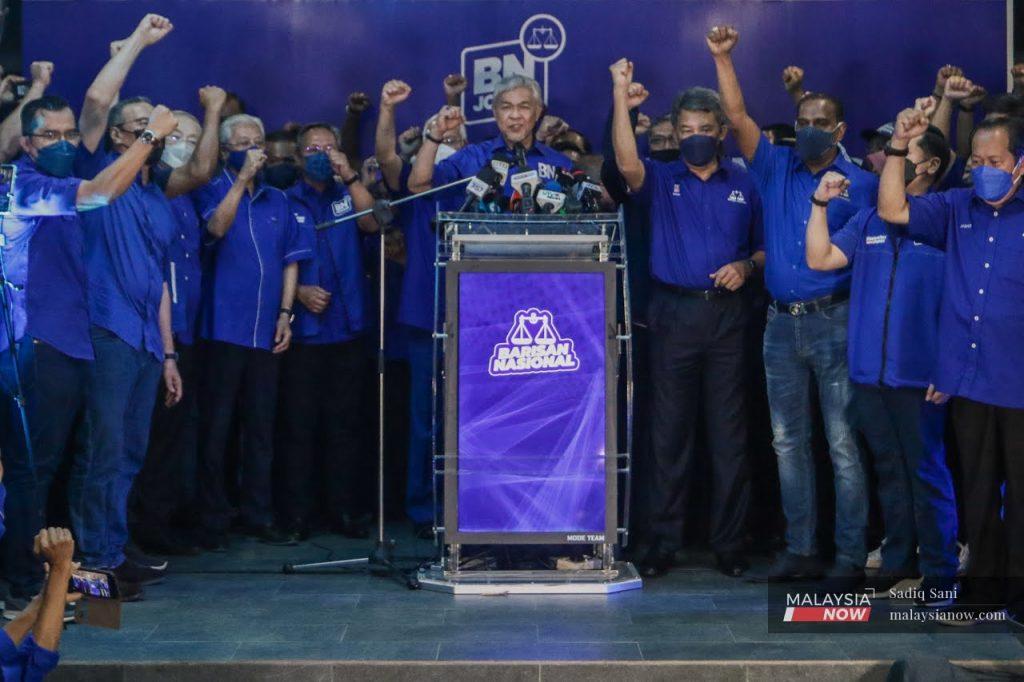‘Endless politicking’ threatens BN’s long-held claim to stability
With internal conflict surfacing despite its strong performance at recent polls, it runs the risk of being seen as a hypocrite, political observers say.
Just In
With trouble brewing in Melaka just seven months after Barisan Nasional’s (BN) landslide victory at the state polls, questions have arisen over the coalition’s claim to stability, long touted as a winning formula at the ballot box.
The Melaka election in November last year was triggered by the withdrawal of support by four assemblymen for Chief Minister Sulaiman Md Ali.
Banking on a public reluctance for political turmoil, BN relied heavily on vows of stability in its campaign for the state polls, a strategy repeated at the Johor election in March this year.
But despite winning with a comfortable majority, BN became embroiled in controversy following what has been described as a power struggle between Sulaiman and Melaka Umno chief Ab Rauf Yusoh.
Rauf is said to be working to topple Sulaiman while Sulaiman’s supporters want the Lendu assemblyman to replace Rauf as head honcho in the state.
Sulaiman, who was sworn in as chief minister again following BN’s election victory, is a member of Umno’s Supreme Council.
A similar albeit short-lived crisis occurred in Johor after the state election which saw Machap assemblyman Onn Hafiz Ghazi replacing incumbent menteri besar Hasni Mohammad in a shock move.
Political observer Mazlan Ali said Umno’s internal conflicts appeared to be coming out into the open.
“It is proving that even though BN won big, the state administrations are still under threat,” Mazlan, of Universiti Teknologi Malaysia, said.
“It shows that Umno and BN themselves are none too stable. This is a cause for concern among the people because they want a stable government.”
Umno has been split into two camps since the 14th general election in May 2018. One bloc is behind party president Ahmad Zahid Hamidi, and the other is part of the federal government formed in conjunction with PAS and Bersatu.
Mazlan said the rumours would also play a role in shaping public perception of the party.
“The people will see Umno as a hypocrite,” he said. “All this time, they have been peddling stability, but now they are harassing the chief minister.”
Oh Ei Sun from the Singapore Institute of International Affairs said the appeal of Umno’s “stability” went beyond the internal strife of the country’s largest Malay party.
“It is more subtle and profound than that,” he told MalaysiaNow.
“It is the suggestion that under Umno, Malay privileges will surely be upheld, whereas under Pakatan Harapan (PH) these special rights may not be as well protected.”
In the context of instability caused by party hopping, Oh said the Malays were not too concerned about who was in power as long as the image of the defender of Malay privileges remained intact.
“Non-Malays won’t support Umno in any case, so in this regard, their views on stability or a lack thereof don’t matter because they wouldn’t vote for Umno anyway,” he said.
“For the Malays, I think the notion of stability or instability is more than compensated for by their fear of a reversion to PH rule.”
Mazlan meanwhile expects an open political crisis to occur if Rauf succeeds in bringing down Sulaiman.
“It’s quite possible that there will be an exit, or those who jump to other parties,” he said.
“People will blame Umno, even if this is done by just a handful of party leaders.”
Given the current situation where people are concerned about the economy and the increase in price of goods, he added, Umno would do well to rein in what he described as its endless politicking.
Subscribe to our newsletter
To be updated with all the latest news and analyses daily.
